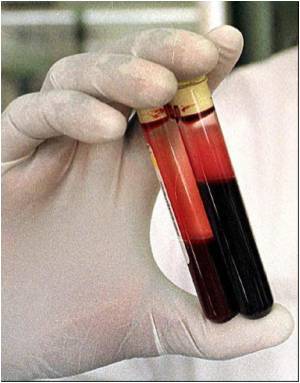In a common heart surgery the transfusion rates for blood products differed from no patients to all patients, and from hospital to hospital, according to a study.

"We don't know whether the variability is potentially harming patients," said lead author Elliott Bennett-Guerrero, M.D., director of Perioperative Clinical Research at Duke Clinical Research Institute and Professor of Anesthesiology/Critical Care. "Even if more liberal transfusion is not harmful to patients, it may represent a significant waste of scarce resources and money."
The researchers didn't find any link between patient mortality rates after surgery and whether the hospital was a high-transfusion site or a low-transfusion site, Bennett-Guerrero said.
The work was published in the Journal of the American Medical Association (JAMA) online on Oct. 12.
"To our knowledge there has never been a published large randomized trial in surgical patients looking at the impact of blood transfusion to determine whether we should be more restrictive or liberal with these transfusions," Bennett-Guerrero said. "Despite the fact that we spend billions of dollars on health care and research, we spend comparatively little on clinical effectiveness trials, which are gaining recognition as an informed way to change clinical practice."
Even when centers performing fewer operations were excluded, the researchers found that transfusion rates among the patients at hospitals ranged from 7.8 percent to 92.8 percent for red blood cells, 0 percent to 97.5 percent for fresh-frozen plasma, and 0.4 percent to 90.4 percent for platelets. The average cost of a unit of RBCs including direct and indirect costs was $761 in a 2010 study published in Transfusion journal.
Advertisement
The research team assessed data from the Society of Thoracic Surgeons (STS) Adult Cardiac Surgery Database kept by the Duke Clinical Research Institute, which captures clinical information from the majority of U.S. cardiac surgical procedures (up to 80 percent of all surgical data available).
Advertisement
Differences in surgical techniques may help explain some of the variability. "There is a reasonable chance that some patients are getting transfused more because they are bleeding more during surgery, which could be linked to differences in surgical technique among the doctors," Bennett-Guerrero said.
Another likely difference is simply the transfusion culture at an institution. This may also have to do with early medical education and training, as some institutions pass along a pro-transfusion culture to those in training, he said.
Largely circumstantial evidence suggests excessive blood transfusion for a patient may be harmful, Bennett Guerrero says. Everyone agrees that transfusion is needed when an injured person has lost most of their blood or has severe anemia. "It is difficult to get agreement, however, in situations where the patient has moderate blood loss or anemia," he said. "No one has yet proven that more liberal transfusion is harmful, and in the absence of results from high-quality randomized clinical studies, it is not surprising that there is variation in transfusion rates."
Source-Eurekalert














